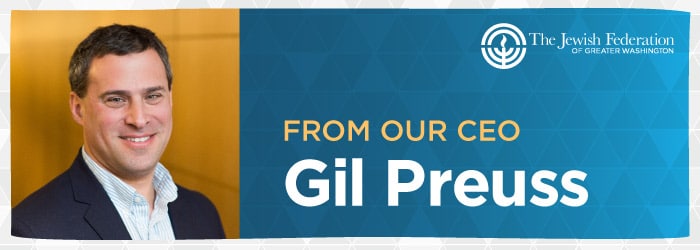-
06 September 2019

In a few weeks, many of us will gather at our local synagogues to usher in the Jewish New Year and observe the High Holidays. We will be inspired to reflect on the past and look ahead to the future. We will be challenged to consider the ways we can move closer to the ideals we hold for ourselves and our world. And we will do this all in the company of friends and neighbors who, like us, are looking to Jewish tradition for guidance and meaning.
This is the power of synagogues today. They have the ability to engage people in ways spiritual, cultural, social, and more. They offer us multiple avenues for exploring deep and personal questions while also helping us connect with each other and strengthen our sense of community.
Particularly in Greater Washington, synagogues also serve as innovative communal hubs. Whether headquartered within historic buildings or taking alternative forms like a downtown minyan, congregations today are helping people to explore everything from Talmudic texts to Israeli culture and politics. They are helping us consider how we fight anti-Semitism, get involved in social justice, and build community in the age of partisan politics.
Synagogue newsletters are overflowing with activities, and congregations are reaching out and welcoming people of all ages and backgrounds through their literal and metaphorical doors. In fact, some synagogues are even moving out of their building to connect with more people and counter some of the stigma around Jewish spirituality, learning, and community.
On any given day, you can find young families socializing with one another, people signing up for Jewish learning courses, high school and college students volunteering in the community, and rabbis diving into Jewish lessons of justice, discernment, courage, and humanity. During the upcoming Days of Awe, people will avail themselves of programs traditional and thoroughly modern and connect to Jewish wisdom and community in ways that speak to them.
At the helm of many of these efforts are dedicated rabbinic leaders who are looking holistically at the community and finding important ways to bring Jewish heritage to life.
The rejuvenation of synagogues comes largely as a response to significant changes in the Jewish community. Many of the strongest synagogues recognize that they do not exist for the sake of their own institution, but rather for the sake of the people they serve and those who have not yet entered their doors. They have been asking themselves what they can do to connect people more fully to G-d and to Jewish peoplehood, ultimately striving to help people feel part of something larger than themselves.
This work is set to make a significant impact on the Jewish future. Synagogues reach more people than any other institution in American Jewish life. It is the one place to which the vast majority of Jewish households will belong at some point in their lives. The choices synagogues make as they build community and connect people to each other and Jewish faith, tradition, and values matter.
I will admit that I used to know a synagogue in New England that drew crowds thanks to its oversized parking lot. Many people attended because it was easy to drive there, not because they expected spiritual growth or connection.
This was a good example of what not to do. But here in Greater Washington, we have stellar examples of what is possible when synagogues embrace the vital role they play in the community and in the lives of individuals. As we step into the year 5780, I know that our community can count on them to help lead us forward.
I am also confident that the people who show up at services in the coming weeks will be there because they want to be. They will be there not because of, but rather in spite of, the parking.
Shabbat Shalom,
Gil
